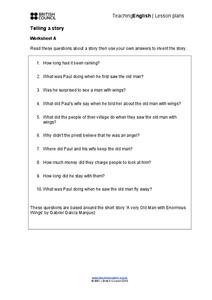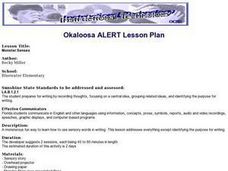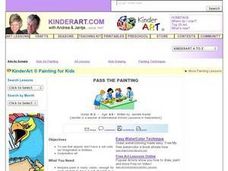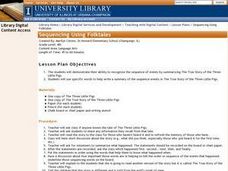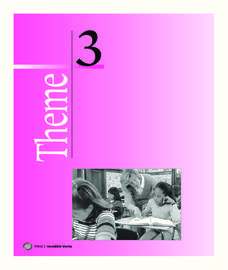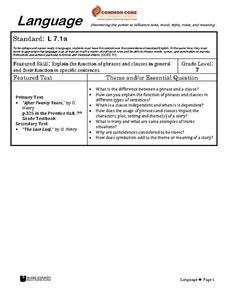Curated OER
Telling A Story
In this ESL storytelling activity, students read ten questions about a story and invent their own answers. Students write the story and then complete 2 pages of questions about what they have written.
Curated OER
We're Going on a Picnic: Lesson 22
In this language arts worksheet, students read the story We're Going on a Picnic and then complete language arts activities with it. Students write spelling words, fill in the blanks to sentences, answer short answer questions, and write...
Curated OER
Monster Senses
Second graders listen to a story that contains many sensory words to describe an object. They listen a second time using a signal to indicate when they hear a sensory word. They write a short story about a monster using appropriate...
Curated OER
Story Elements
Eighth graders identify six story elements (setting, characters, character traits, plot, resolution, and point of view) and create short stories utilizing all six elements. They are introduced to story elements as the things that make up...
Curated OER
Presentations Come Alive!
Partners create oral presentations about a short story or poem incorporating audiovisual aids. Then they make presentations to their classmates. Linked story map will help guide readers' organization of their presentation;...
Curated OER
Dr. Heidegger's Experiment
What are the pros and cons of prolonging life? Incorporate real-world issues into the study of literature using Dr. Heidegger's Experiment. Through the exploration of pre-determined websites, scholars consider several related...
Curated OER
"The Lottery," by Shirley Jackson
Middle schoolers who are about to read the chilling tale, The Lottery, do some writing beforehand. They are asked to write how their lives would change if they won a huge lottery jackpot. Then, they read the short story, and will be...
Curated OER
Pass the Painting
After reading a story or informational text describing an animal, your class gets creative and collaborative with paint. In groups, they brainstorm all the parts of an animal, they then take turns painting those parts. One child starts...
Curated OER
Express Yourself Lesson Seed 7: Pronouns
Take a break from literature study to address some grammatical concerns. Using a text you've already read in your class, show how to analyze pronoun use. After watching the master, pairs analyze a short excerpt on their own, identifying...
Curated OER
Out of the Dust: Questioning Strategies
Bloom's Taxonomy is a great way to address the many levels of comprehension. With explanations and examples of each level, you can create questions that focus on knowledge, comprehension, application, analysis, synthesis, and evaluation.
Curated OER
Reading Bugs
Review the phonemic sounds of the alphabet letters before examining how to blend letter sounds to make a word. During this teacher-modeled lesson, learners make word bugs out of three phonemes that blend together. As an assessment, read...
Curated OER
Writing in Different Viewpoints
Students explore different viewpoints through short stories. In this literature activity, students read a classic short story. Students then write a short story from a different point of view.
Curated OER
Imitating An Author's Style
Learners explore author's style. In this literature lesson, students read and take notes on a short story of their choice. Learners write an original short story imitating the author's style.
Curated OER
Comparison and Contrast - D.H. Lawrence
Students explore "The Rocking Horse Winner" and "The Horse Dealer's Daughter" by D. H. Lawrence. In this literature instructional activity, students read these short stories. Students write an essay comparing the two stories according to...
Curated OER
Bobby's Big Birthday Party: Reading Comprehension
In this reading comprehension worksheet, students read a short story about a birthday party, then answer 6 multiple choice questions. Worksheet contains links to additional activities.
Curated OER
So Much Depends Upon...Sixteen-Word Imagery Poems Inspired by Love that Dog by Sharon Creech
After reading Love That Dog by Sharon Creech (and possibly shedding a few tears), middle schoolers work on their own sixteen-word poems with a Six Trait writing activity. They focus on word choice in this activity to capture an...
Premier Literacy
Point of View
Incorporate technology into a literature instructional activity with an innovative language arts instructional activity. Middle schoolers read an electronic version of original stories or fairy tales, and after determining the point...
K5 Learning
The Bee
See what all the buzz is about with a reading comprehension activity! Third and fourth graders read a short informational passage about bees before answering four questions about what they have learned.
Curated OER
Compare Two Versions: Folk Tales, Sequencing, and Summary
Compare two versions of "The Three Little Pigs" (traditional and Jon Scieszka's The True Story of the Three Little Pigs, told from the wolf's point of view). As your 4th graders recount the familiar version of the story, emphasize the...
Houghton Mifflin Harcourt
Incredible Stories: English Language Development Lessons (Theme 3)
English language learners get extra help understanding the language and concepts in a thematic unit on fantasy and realism from a 40-page packet filled with activities, exercises, and tips.
Curated OER
"User Friendly" Cause and Effect
Bring literature to life with your SMART board and this literary analysis lesson plan. While reading "User Friendly" by T. Ernesto Bethancourt (from the Holt Elements of Literature textbook by Kylene Beers), have your class discuss the...
K5 Learning
Landforms
Valleys, mountains, and plateaus are just a few geographic landforms on our Earth. Read about these types and more in a brief landform passage. After reading, learners respond to six short answer comprehension questions.
Wake County Public Schools
Language
Have your class doing everything from reading literature, analyzing literary devices, identifying independent and dependent clauses, discussing, and writing creatively with the rich resource found here. After a mini lesson plan on...
Lafayette Parrish School System
Teaching Tone and Mood
Tone and Mood are not synonymous! Introduce young readers to these literary devices with a series of exercises that not only point out the significant differences between the terms but also shows them how to identify both the tone and...


